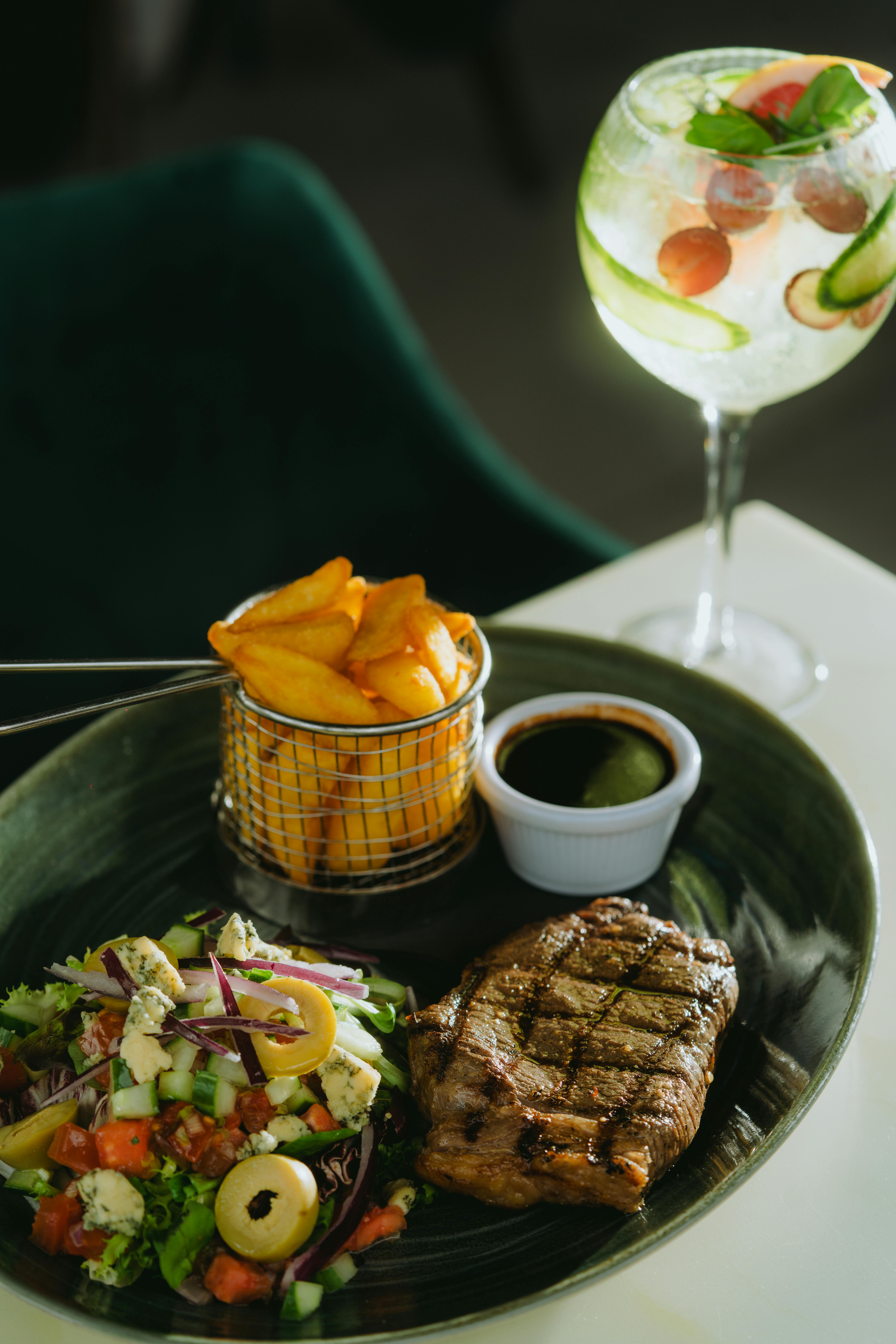If you often find yourself feeling stressed and overwhelmed, you may be wondering if there are any specific foods that can help you relax and reduce stress. It turns out that certain foods do have the power to promote relaxation and calm the mind. From soothing herbal teas to mood-boosting dark chocolate, incorporating these foods into your diet can be a delicious way to support your mental well-being. Whether it’s reaching for a handful of nuts or sipping on a warm cup of chamomile tea, read on to discover the foods that can aid in relaxation and stress reduction.

The Relationship Between Food and Stress
In today’s fast-paced and stressful world, it’s becoming increasingly important to find ways to manage and reduce stress. While traditional methods such as exercise, meditation, and therapy are often recommended, many people overlook the impact that diet can have on stress levels. The foods we eat have a direct effect on our bodies and minds, and making certain dietary choices can significantly contribute to relaxation and stress reduction. By understanding the impact of diet on stress levels and the role of specific nutrients, it becomes clear that there are indeed foods that can aid in relaxation and stress reduction.
Impact of Diet on Stress Levels
The food we eat not only provides us with energy but also plays a crucial role in our overall well-being. When it comes to stress management, diet can have both positive and negative effects. Certain foods can exacerbate stress, while others can help us relax and reduce stress levels.
Foods high in sugar, caffeine, and processed ingredients can actually increase stress levels by causing spikes in blood sugar and disrupting hormone levels in the body. On the other hand, a diet that is rich in whole foods, fruits, vegetables, lean proteins, and healthy fats can support the body’s ability to cope with stress and promote relaxation.

Role of Nutrients in Stress Management
Several nutrients have been found to play a significant role in managing stress levels. These nutrients not only support the body’s functions but also contribute to mental well-being. Here are some key nutrients that have been shown to be particularly beneficial for stress management:
B vitamins: B vitamins, including B6, B9 (folate), and B12, are essential for the production of neurotransmitters that regulate mood and stress. Foods rich in B vitamins include leafy greens, whole grains, and lean meats.
Magnesium: Magnesium is a mineral that has a calming effect on the body and helps regulate the stress response. Good sources of magnesium include spinach, almonds, and bananas.
Omega-3 fatty acids: Omega-3 fatty acids have been shown to reduce inflammation and improve mood. Fatty fish like salmon, as well as flaxseeds and walnuts, are excellent sources of omega-3 fatty acids.
Antioxidants: Antioxidants help protect the body from oxidative stress, which can contribute to an increase in stress levels. Foods rich in antioxidants include berries, dark chocolate, and turmeric.
By ensuring an adequate intake of these nutrients through a well-balanced diet, you can support your body’s ability to manage stress and promote relaxation.
Foods That Promote Relaxation and Reduce Stress
Now that we understand the impact of diet on stress levels and the role of nutrients, it’s time to explore specific foods that can aid in relaxation and stress reduction. These foods have been found to have calming properties and can help promote a sense of well-being. Let’s take a closer look at some of these stress-reducing foods:
Dark Chocolate
Dark chocolate contains antioxidants and magnesium, which can help relax blood vessels and improve mood. Enjoy a small piece of dark chocolate as a treat to help unwind and reduce stress.
Spinach and Leafy Greens
Leafy greens like spinach are excellent sources of magnesium and B vitamins. Incorporating spinach into salads, smoothies, or sautéed dishes can provide a calming effect on the body.
Salmon and Other Fatty Fish
Fatty fish, such as salmon, contain omega-3 fatty acids, which have been shown to reduce stress hormones and promote a sense of calm. Include grilled or baked salmon in your meals to reap these stress-relieving benefits.
Blueberries and Other Berries
Berries are packed with antioxidants that help combat stress and inflammation in the body. They can be enjoyed on their own, added to yogurt or oatmeal, or blended into smoothies for a delicious stress-busting snack.
Avocados
Avocados are rich in healthy fats, B vitamins, and magnesium, all of which contribute to stress reduction. Whether in salads, sandwiches, or as a spread on toast, avocados are a versatile and nutritious addition to any stress-reducing meal.
Almonds and Pistachios
Nuts, such as almonds and pistachios, are great sources of healthy fats and magnesium. Snacking on a handful of these nuts can provide a calming effect and help reduce stress levels.
Chamomile Tea
Chamomile tea has long been recognized for its calming properties. Sipping on a warm cup of chamomile tea before bed or during a stressful day can help promote relaxation and reduce stress.
Turmeric
Turmeric contains curcumin, a compound with powerful anti-inflammatory and antioxidant properties. Incorporate turmeric into your cooking or enjoy a turmeric latte to reap the stress-reducing benefits.
Oatmeal
Oatmeal is a complex carbohydrate that helps boost serotonin levels in the brain, promoting a sense of calm and well-being. Start your day with a bowl of oatmeal topped with nuts and berries for a stress-relieving breakfast.
By incorporating these stress-reducing foods into your diet, you can support your body’s ability to relax and manage stress effectively.

Beverages for Relaxation and Stress Reduction
In addition to food, certain beverages can also aid in relaxation and stress reduction. These beverages contain compounds that promote a calm state of mind and help the body cope with stress. Let’s explore some of these stress-reducing beverages:
Green Tea
Green tea contains the amino acid L-theanine, which has been shown to promote relaxation and reduce stress levels. Sip on a cup of green tea throughout the day to benefit from its calming effects.
Milk
Milk contains tryptophan, an amino acid that helps the body produce serotonin, a neurotransmitter that promotes relaxation and improves mood. Enjoy a warm glass of milk before bed to unwind and reduce stress.
Herbal and Floral Teas
Herbal teas, such as chamomile, lavender, and peppermint, have properties that can help calm the body and mind. Experiment with different herbal and floral blends to find the ones that work best for you.
Incorporating these stress-reducing beverages into your daily routine can provide a soothing effect and contribute to overall well-being.
Meal Ideas for Stress Relief
Now that we know which foods and beverages can promote relaxation and reduce stress, let’s put them together into some delicious and stress-relieving meal ideas. These meals are packed with stress-reducing ingredients and are easy to prepare:
Grilled Salmon with Spinach Salad
Grill a piece of salmon and serve it on a bed of fresh spinach, tomatoes, cucumbers, and avocado slices. Drizzle with a lemon and olive oil dressing for a refreshing and stress-relieving meal.
Dark Chocolate and Nut Trail Mix
Create a trail mix with a mix of dark chocolate chunks, almonds, pistachios, and dried berries. This snack is not only satisfying but also provides stress-reducing nutrients.
Avocado Toast with a Side of Blueberries
Toast a slice of whole-grain bread and top it with mashed avocado. Serve it with a side of fresh blueberries for a stress-relieving breakfast or light meal.
Oatmeal with Almonds and Bananas
Prepare a bowl of oatmeal and top it with sliced almonds and sliced bananas. The combination of complex carbohydrates, healthy fats, and magnesium makes this breakfast perfect for stress relief.
Chamomile-Infused Roast Chicken with Turmeric Rice
Infuse chicken with chamomile tea before roasting and serve it with turmeric-infused rice. This flavorful and stress-relieving dish is both comforting and nutritious.
Yogurt Parfait with Berries and Granola
Layer Greek yogurt, fresh berries, and granola for a stress-relieving snack or dessert. The combination of protein, antioxidants, and healthy fats will leave you feeling satisfied and calm.
Incorporating Stress-Reducing Foods into Your Diet
Now that you have a variety of stress-reducing foods and meals to choose from, it’s important to consider how to incorporate them into your daily diet. Making these foods a part of your routine can lead to long-term stress reduction and overall well-being. Here are some tips for incorporating stress-reducing foods into your diet:
Planning and Preparation
Plan your meals and snacks ahead of time to ensure that you have stress-relieving foods readily available. Consider batch cooking or meal prepping to make incorporating these foods into your diet easier and more convenient.
Substitutions and Additions
Look for opportunities to substitute stress-inducing foods with stress-reducing alternatives. For example, swap sugary snacks for a piece of dark chocolate and opt for herbal tea instead of caffeinated beverages when you need a moment to relax.
Mindful Eating
Practice mindful eating by savoring each bite and paying attention to how different foods make you feel. Be aware of the connection between your diet and your stress levels, and make choices that align with your goals of relaxation and stress reduction.
By adopting these practices, you can ensure that stress-reducing foods become a regular part of your diet and contribute to your overall well-being.
Conclusion
The relationship between food and stress is undeniable. By making conscious choices about the foods we eat and beverages we consume, we can effectively manage and reduce stress levels. Incorporating stress-reducing foods rich in nutrients such as B vitamins, magnesium, omega-3 fatty acids, and antioxidants can provide significant benefits to our mental well-being. From dark chocolate to salmon to herbal tea, there are numerous options for stress-relieving foods and beverages. By focusing on meal ideas that incorporate these ingredients and practicing mindful eating, we can prioritize relaxation and stress reduction in our daily lives. So, why not start today by including these stress-reducing foods in your diet? Your mind and body will thank you for it.
